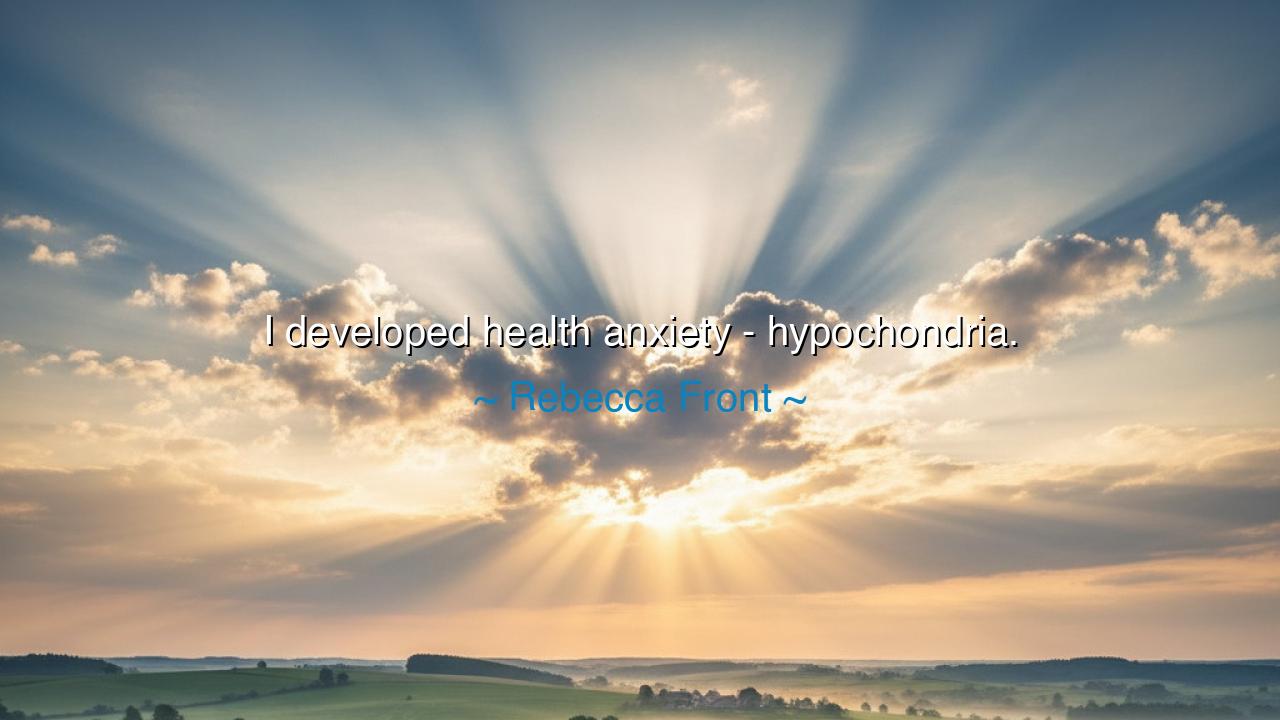
I developed health anxiety - hypochondria.






“I developed health anxiety — hypochondria.” Thus spoke Rebecca Front, an artist of mind and heart, whose courage was not in conquering mountains or crossing oceans, but in facing the unseen storms that raged within. These few words, simple in form yet profound in essence, reveal the secret battle of many souls — a battle not against the sword or the tempest, but against the imagination turned fearful, the mind that trembles at its own power. To understand these words is to glimpse the frailty and strength of human nature alike — the struggle between fear and awareness, illusion and truth, body and spirit.
In the ancient scrolls, wise physicians and philosophers spoke of the mind’s dominion over the body. They taught that the body is the vessel of the soul, but the mind is its captain — and when the captain is seized by dread, the vessel drifts upon dark waters. Health anxiety, or hypochondria, is the shadow cast by our instinct to survive. It is born from the noble desire to preserve life, yet twisted by fear into an endless search for harm where none may dwell. The ancients would say, “That which you gaze upon with fear, you give life to.” Thus, in fearing illness, one gives sickness a phantom form — a ghost that feeds on thought and grows with attention.
Behold, then, the paradox of the human spirit: that we may be destroyed not by what is real, but by what we imagine. There once lived a Roman scholar, Lucretius, who taught that fear of death was the greatest poison of the mind. Though he spoke of it centuries before Rebecca Front’s confession, his lesson echoes hers: that the terror of frailty can consume more vitality than frailty itself. Lucretius urged his students to look upon nature as it is — vast, impartial, ever-moving — and to find peace in acceptance. For what is the body but a fleeting garment worn by the soul for a season? To live in constant dread of its unraveling is to miss the glory of the sunlight, the laughter of friends, the song of existence itself.
Yet we must not judge too harshly those who suffer under the weight of such fear. For hypochondria is not cowardice, but the cry of a spirit too aware, too sensitive to the subtle rhythms of life and decay. It is the heart that listens too closely, the mind that magnifies every whisper from the flesh. Those who endure it fight a war unseen, waged each day between reason and panic, between the breath of life and the dread of losing it. To confess, as Rebecca Front did, “I developed health anxiety,” is to speak not in weakness, but in truth — and truth, even when painful, is the beginning of healing.
Know this, young listener: to live is to be uncertain. The body will ache, the mind will waver, the heart will tremble — yet to live fully, one must not be enslaved by fear of the inevitable. The ancients would say, “He who fears the storm dies before the rain.” Let not your days be ruled by imaginary illnesses or by the specter of death that visits every mortal. Instead, turn your eyes to the living moment, where health is not the absence of sickness, but the presence of peace.
There are ways, even in the modern age, to quiet the restless mind. Seek not constant reassurance, but cultivate trust — trust in your body’s wisdom, in time’s healing, in the calm that comes from acceptance. Let meditation be your physician, breath your medicine, and gratitude your armor. When fear rises, do not flee it, but name it gently and let it pass, as clouds drift across the sky. For you are not your fear; you are the sky itself — vast, enduring, unbroken.
The lesson, then, is simple yet eternal: the mind can wound, but it can also mend. When you feel the shadow of anxiety creep across your thoughts, remember Rebecca Front’s courage in naming hers. Speak your fears, do not hide them. Share them, and they lose their teeth. For in acknowledging the storm, you reclaim mastery over your ship. Let this be your vow — not to seek a life free from uncertainty, but to meet uncertainty with serenity.
And so, carry these words as a charm against the darkness: “The body may falter, but the spirit must not tremble.” To live wisely is not to live without fear, but to walk beside it, unafraid — to dwell in the fragile beauty of life and yet call it good.






AAdministratorAdministrator
Welcome, honored guests. Please leave a comment, we will respond soon